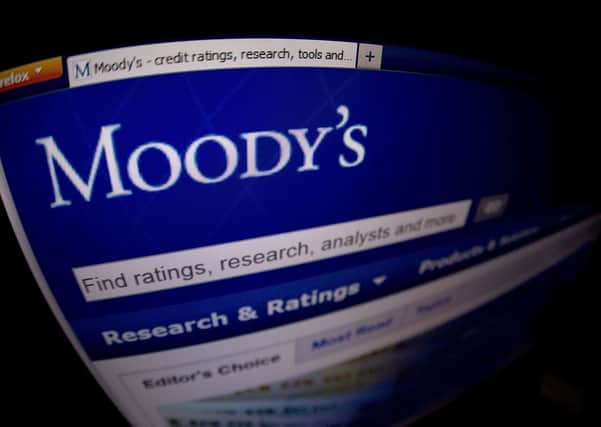Erikka Askeland: ‘New normal’ as Moody’s and Co downgraded


Yesterday, a group of economists dismissed the verdict of Moody’s Investors Service after it put the UK’s credit rating on “negative outlook”. The move by Moody’s, which means a likelihood of losing the triple A, signalled that it has finally occurred to the ratings nerds that there might be some issues for the UK if Europe goes down the toilet. Well, thanks for showing up, guys.
But when we woke to Moody’s little surprise – issued after the New York markets closed and breaking around midnight here – what did the markets do? Not that much.
Advertisement
Hide AdAdvertisement
Hide AdEven after the City boys had a full working day to digest the news that the UK, along with a number of other European countries, was looking a little shaky, the FTSE 100 fell only five points or so while sterling’s fall could only be described as a wee slip.
Instead, Moody’s seemed mainly to be derided for the sheer absurdity of its own statement. Fidelity’s Trevor Greetham, and others, pointed out that while the agency cited a weaker growth outlook as the prime driver for its decision to put the UK on negative credit watch, it had the nerve to say the economic weakness was mainly due to the austerity it largely recommended. Damned if you do, damned if you don’t.
It is not that the UK’s economy isn’t on a knife edge. But the news is so mixed. For every PMI survey that hails the fastest growth in ten months in January, there are “alarm bells ringing” for Scottish retailers as January proved the cruelest month since records began in 1999.
Ratings on government debt are meant to play a significant role in how much it costs to borrow because a lower rating often means countries pay higher interest rates on their bonds to attract investors. This is just what is causing the riots in Greece.
But a credit ratings drop does not always cause investors to ratchet up their prices. The US has actually seen its borrowing rates fall since Standard & Poor’s stripped it of its triple A rating last August.
When French politicians objected to an S&P downgrading of the country, many observers noted that Paris had long been paying higher costs to borrow money than most other triple-rated countries – an indication the markets had already effectively eroded France’s rating.
The biggest problem with the ratings agencies’ credibility is they didn’t spot the crud that was being sliced and diced by investment banks to magically create triple-A rated investments. Either that or collusion with their funders (the very same investment banks) meant they just turned a blind eye to the “weapons of mass destruction” that corrupted and then nearly killed the system of western finance.
The truth is most bond traders and asset managers are now doing their own maths on what is a good investment and what is not, making whatever it is the credit agencies say less relevant to their buying decisions.
Advertisement
Hide AdAdvertisement
Hide AdFor the past few months, the UK has been considered a “safe haven” when compared with the screaming mess that is European sovereign debt – with the exception of Germany, of course – which Moody’s seems to think is still top dog.
But what we are soon likely to see is a world where sovereigns with high debt are no longer considered triple A, whether the ratings agencies acknowledge it or not. And that will be just another step into the “new normal” that faces investors, pensioners and all citizens of the formerly “rich”, but increasingly poor, West.
Pressure eases but King still has explaining to do
HARD-pressed families weren’t the only ones to breath a sigh of relief as official figures revealed the rate of inflation fell to its lowest level in more than a year.
The Governor of the Bank of England, too, will start to feel a little more relaxed after inflation remained stubbornly high last year while he promised it would come down.
But at 3.6 per cent, Sir Mervyn King still has to write his letter to Chancellor George Osborne on why it still hasn’t hit that 2 per cent target.
And while most seem to hold out the expectation – or hope? – that inflation will continue notching down, he’s not out of the woods yet.